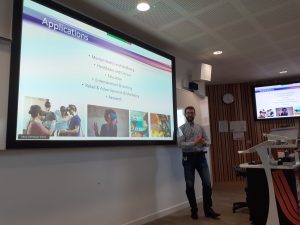Recent advances in neuroimaging, accompanying the coalescence of multiple neurophysiological registration modalities in virtual reality settings, are experiencing a substantial growth in brain research. These developments in experimental and analytical approaches to probe the human brain, open exciting avenues for novel applications in e.g., health, media industries, education, sport, art, or tourism. This topic was the focus of the second symposium of the Interdisciplinary Neuroscience Research Centre , which took place on the last 16th of January at the Inspire Lecture Theatre on Talbot Campus.
The symposium, entitled “New Frontiers in Neuroscience: Neuroimaging and Integrative Multi-Sensing Methods” concentrated on these two linking themes from a cross-disciplinary angle, leveraging synergies between BU departments, collaborators in other universities, industry, charities, and at the NHS.
The event started with a fascinating talk by Mavi Sanchez-Vives (Biomedical Research Institute IDIBAPS, Barcelona), Leader of the Human Brain Project work-package entitled “Networks underlying brain cognition and consciousness”.

Prof Fred Charles presenting at the 2nd INRC Symposium.
Next, our first session revolved around the integration of multi-sensing methodologies and their industrial applications. In this focused session, we enjoyed three exciting talks, the opening one by Prof. Fred Charles (BU) on multimodal immersive neuro-sensing approaches; followed by Dr. Ifigeneia Mavridou (EmteqLabs), who discussed her appealing research of affective responses to VR environments. Finally, Dr. Federica Degno (BU) showed us her avant-garde work on co-registration of eye movements and EEG recordings.
The second session, centred on neuroimaging recordings in clinical neuroscience, was opened by Dr. Ruth Williamson (Deputy Chief Medical Officer, University Hospitals Dorset), who presented her multidisciplinary study of the effect of cold-water immersion on brain function, inspiring a stimulating debate on its clinical applications. The symposium concluded with Prof. Carol Clark’s (BU) very interesting talk on mapping brain structure, function and cognition in women engaged in sporting activities.
After the symposium, we had two follow-up activities in the afternoon: first a seminar, sponsored by the Department of Psychology and the MINE research cluster, by Dr. Benjamin Schöene (Universität Osnabrück), who debated the novel perspectives that VR offers in psychological research; followed by a visit to the Multimodal Immersive Neuro-sensing lab for natural neuro-behavioural measurement (MINE), led by Dr Xun He .
All of us in the INRC would like to thank very much the attendants to the symposium, and a huge thanks to the speakers for accepting our invitation, and for their compelling talks.
For colleagues who could not make it, the two thematic sessions were recorded, and can be accesed on this link. If you are interest in getting in touch, contributing or joining the Interdisciplinary Neuroscience Research Centre, please do not hesitate to contact Ellen Seiss, (eseiss@bourenmouth.ac.uk) or Emili Balaguer-Ballester (eb-ballester@bournemouth.ac.uk).
Thank you again for your interest, and we are looking forward to seeing you in our next activities.
Kind regards,
Ellen and Emili on behalf of all of us at the INRC
 New Frontiers in Neuroscience: Neuroimaging and Integrative Multi-Sensing Methods
New Frontiers in Neuroscience: Neuroimaging and Integrative Multi-Sensing Methods










 On Christmas Day in the Morning…
On Christmas Day in the Morning… New Nepal scoping review on maternal & neonatal health
New Nepal scoping review on maternal & neonatal health Writing policy briefs
Writing policy briefs ECR Funding Open Call: Research Culture & Community Grant – Application Deadline Friday 12 December
ECR Funding Open Call: Research Culture & Community Grant – Application Deadline Friday 12 December MSCA Postdoctoral Fellowships 2025 Call
MSCA Postdoctoral Fellowships 2025 Call ERC Advanced Grant 2025 Webinar
ERC Advanced Grant 2025 Webinar Horizon Europe Work Programme 2025 Published
Horizon Europe Work Programme 2025 Published Horizon Europe 2025 Work Programme pre-Published
Horizon Europe 2025 Work Programme pre-Published Update on UKRO services
Update on UKRO services European research project exploring use of ‘virtual twins’ to better manage metabolic associated fatty liver disease
European research project exploring use of ‘virtual twins’ to better manage metabolic associated fatty liver disease